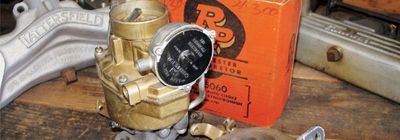
"A chain is no stronger than its weakest link, and the carburetor is only one link in the engine. Carburetion is dependent on the spark timing, valve timing, engine compression, ignition system, and other component parts." Rochester Carburetors Operation and Service Manual, August 1951.
That statement was made in regard to complaints received from General Motors car owners who were being led to believe their Rochester carburetors were the sole cause of decreased fuel mileage and/or sub-par performance. Obviously, both Rochester and GM were the wiser-well, at least the former was-but to this day, many people are too quick to blame their poor old carburetor for various engine-related issues. Being that it's been well over a half-century since the B, BC, and BV series of single-barrels were first introduced as standard equipment on GM cars and trucks, sometimes complaints are quite valid; other times, well, a bit of further education on behalf of the complainer would help. In other words, understand your carburetor.
For me, carburetors were (and still sort of are) like ignition systems-they either worked or they didn't. Beyond simple idle adjustment and "guestimate" timing by ear, problems within the induction or ignition systems were typically brought to others to be diagnosed and subsequently fixed. Over time, asking for help got old, so I began expanding my mind, as it were, learning the insides of the mechanical workings as best as my wits would allow.
While I still have volumes of information to digest regarding carburetion as a whole (and because of that, I will let Ron Ceridono continue this series as it expands into four-barrels), I have come to grips with some of the intricacies of vintage aspiration-well, at least the '50s-era Rochesters commonplace to Chevy six-cylinders are no longer a huge mystery. Though I won't make the claim that these single-throaters are by any means superior to other available GM applications such as Carters, Strombergs, or Zeniths, I can say I am way more comfortable now with a Model B or BC (or two) on my 235-and I'm confident it won't leak fuel like a sieve.
Just as the carburetor is but a single link in the engine's chain, each individual part of the carb itself is a mini link. From the accelerator pump to the metering jet to even the choke assembly, your Rochester isn't going to perform as it was meant to unless each and every link is not only solid, but functioning as intended. Sticky floats or needle valves (due to wear, debris, or even improper adjustment), worn-out power valvesprings, or basically anything that's dirty or damaged will result in adverse performance at best. Knowing how to keep your Rochester in good working order is a key element in assuring your induction chain is taut, and that might just begin with a good-old rebuild job, which is exactly what I did.
Rebuild kits for most popular single-barrel carburetors are still readily available (as are remanufactured complete units for many applications, though quality and price vary widely), but be cautious of new old stock (NOS) kits, as time may have taken a toll on certain parts depending on where/how they were stored. Obviously, if you have the choice, going with brand parts versus overseas no-name stuff is best, but we all know that's not always an option in this day and age. You won't find the dominant Delco or RP (Rochester Products) presence at auto parts stores like you could in the past. Fortunately, Chevs of the 40's not only offers high-quality rebuild kits, but individual parts as well as complete rebuilt carburetors (Rochester and Carter W-1s).
Still, even with the best replacement parts possible, there's no overcoming excessively worn-out items such as throttle bodies with sloppy butterfly shafts or pitted bores in the air horn or main body. While that grungy doorstop of a carburetor you recently saw at the swap meet may not have seemed worth the $5 asking price, underneath that dilapidated shell may have been some good spare parts. I'd rather be out a cheap lunch than having to call everyone I know on Sunday afternoon in a desperate attempt to find the irreplaceable! Just something to keep in mind.
In the coming months, we'll be covering the ins and outs of even more carburetors, from double-barreled Strombergs to modern four-barrels. Stay tuned.